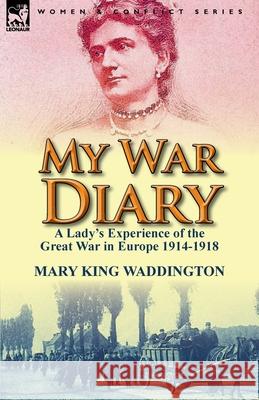My War Diary: A Lady's Experience of the Great War in Europe 1914-1918 » książka
My War Diary: A Lady's Experience of the Great War in Europe 1914-1918
ISBN-13: 9781782820253 / Angielski / Miękka / 2012 / 208 str.
My War Diary: A Lady's Experience of the Great War in Europe 1914-1918
ISBN-13: 9781782820253 / Angielski / Miękka / 2012 / 208 str.
(netto: 74,37 VAT: 5%)
Najniższa cena z 30 dni: 73,20 zł
ok. 13-18 dni roboczych.
Darmowa dostawa!
The Great War in France-a lady's intimate view
Mary King Waddington was born in New York City. She married a French statesman, William Henry Waddington, his parents were naturalised citizens of France and he went on to became prime minister of his country. Mary was a prolific diarist and her account of her experiences as the wife of a diplomat ran to several volumes and were well regarded and quite popular at the time. At the outbreak of the First World War, Mary was living in Paris. Hers was the war the civilians knew and her diary gives the reader interesting insights into the domestic life of the French nation during the conflict. As Helen Prince writes in the introduction to this book, 'one fact is gossip-two related facts are history.' So we read of the two grandsons who discover a German skull, how lawns were given over to growing potatoes; we experience railway station goodbyes and many other poignant events and scenes which will vividly bring this time of tragedy back to life. Once again the reader will discover the indomitable spirit that many women displayed in times of adversity whilst caring for children, the poor, the dispossessed, attending to the wounded and other charitable acts.
Leonaur editions are newly typeset and are not facsimiles; each title is available in softcover and hardback with dustjacket; our hardbacks are cloth bound and feature gold foil lettering on their spines and fabric head and tail bands.
The Great War in France-a ladys intimate view
Mary King Waddington was born in New York City. She married a French statesman, William Henry Waddington, his parents were naturalised citizens of France and he went on to became prime minister of his country. Mary was a prolific diarist and her account of her experiences as the wife of a diplomat ran to several volumes and were well regarded and quite popular at the time. At the outbreak of the First World War, Mary was living in Paris. Hers was the war the civilians knew and her diary gives the reader interesting insights into the domestic life of the French nation during the conflict. As Helen Prince writes in the introduction to this book, one fact is gossip-two related facts are history. So we read of the two grandsons who discover a German skull, how lawns were given over to growing potatoes; we experience railway station goodbyes and many other poignant events and scenes which will vividly bring this time of tragedy back to life. Once again the reader will discover the indomitable spirit that many women displayed in times of adversity whilst caring for children, the poor, the dispossessed, attending to the wounded and other charitable acts.
Leonaur editions are newly typeset and are not facsimiles; each title is available in softcover and hardback with dustjacket; our hardbacks are cloth bound and feature gold foil lettering on their spines and fabric head and tail bands.











